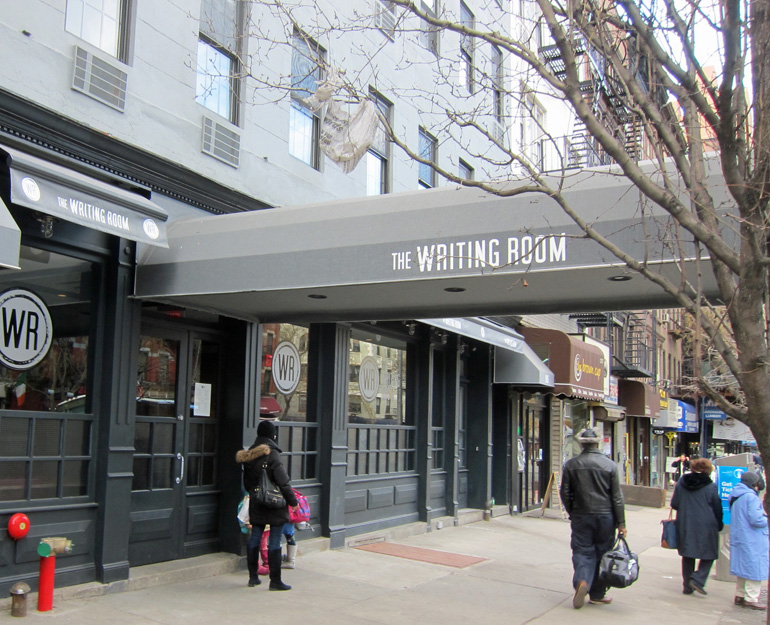Gotham Diary:
Look for Luck
27 February 2014
The extent to which our culture might be characterized as visual has been brought home to me by the Facebook selfie that I mentioned yesterday. I’ve been writing updates about Remicade infusions since I signed on at Facebook, however many years ago, but I’ve illustrated them with pictures of the Hospital for Special Surgery and suchlike. Responses to the image of an ailing older man suggest that some friends and even relations do not slow down for pictures of buildings. I’d had no idea that the selfie post would be news.
***
Freedom — what a conundrum. After her crystal-clear, authoritative essay on authority, Hannah Arendt begins the corresponding one on freedom with an almost desperate cry. “To raise the question, what is freedom? seems to be a hopeless enterprise.” I’ve reached the point, a few pages in, where Arendt argues that freedom was a concept that could have no place in pre-Christian Greek philosophy, because it was political in nature and there could be no politics in philosophy. Floundering in bed this morning — I couldn’t have called it “thinking” — I had one of those lightbulb moments. “Freedom” is a negative state, the absence of being something else, to wit, a slave. Without servitude, freedom makes no sense. Only slaveholders — such as the Virginian planters who co-founded the United States — could have a proper understanding of freedom. There’s nothing like beginning the day with a tart irony.
This is Isaiah Berlin’s freedom from, I think. Christianity introduced freedom to: the freedom, specifically, to override the dictates of fear and desire. In vernacular terms, this is the freedom to go on a strict diet, something that Americans, freedom from junkies that we are, don’t practically associate with “freedom.” Freedom to is austere; it is really freedom not to. I delight in the freedom not to watch television — a freedom that I shall forego on Sunday night, to watch the Academy Awards ceremony. Watching television is an annual event for us; we haven’t turned it on since last March. The freedom not to watch television affords me lots of time in which to exercise my freedom to read and write. My freedom to read and right is therefore made possible by my freedom from television.
I have never taken the problem of free will seriously. I don’t see anything in it but a bone of contention for intellectual terriers with nothing better to do. I’m also inclined to believe that chaos is the key. Chaos is the key because it introduces unpredictability into determinist systems. Physics, in other words, is not all clockwork. I do not require metaphysical “free will” to rescue me from slavery to carnal procedures; I can look for luck. Yesterday, at the Hi-Life, where, given my recent habits, a regular staffer would have brought me a Manhattan the moment I sat down, I was confronted instead with the need to make a decision by a woman who didn’t know me. In the moment of ordering my lunch, I felt so good and clear and thoughtful and generally happy that the idea of pouring a wooze-making cocktail down my gullet was sharply repellent. In that moment. Two moments earlier, however, I’d been looking forward to the “Take it easy!” feeling that envelopes me with the first sip of a Manhattan. I have no idea what intervened to cancel my desire to “take it easy.” At no time did I have the sense of exercising willpower. Indeed, it was a mere postponement: I’d have a Manhattan for dessert. Only, when the moment came to order it, I asked for the check instead.
Besides, we are learning more every day about the physiology of decision-making. A healthy blood-sugar level is required, for one thing. For another, the number of decisions that can be made in any given period is limited. As an affluent white man with steady habits, I am rarely called on to make difficult decisions. (And for the most part, my difficult decisions concern getting rid of surplus possessions. I don’t have to worry about needs.) Nothing disgusts me more than the allegation that poor people are kept in poverty by their bad decisions, when in fact they are kept in poverty by their poverty, which denies them the resources and the stability to make a smaller number of decisions with well-fed composure. You might as well argue that the blind man has the “freedom” to see, if only he would learn to exercise it.
Rule of thumb: be wary of urging other people to exercise the freedom to. As for yourself, look for luck.

